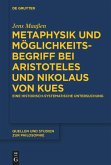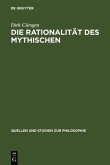What are Platonic ideas? What actual necessity is there for the supposition of such entities? What is their relation to the human soul? These questions form the core of this book. First, the Theory of Ideas is developed. Then, questions are posed as to how knowledge of ideas is possible and what meaning such ideas have practically in our lives. Then a unified concept of the soul is developed on the basis of the theoretical and practical aspects of Plato's philosophy.
Was sind platonische Ideen? Welche sachliche Notwendigkeit gibt es für die Annahme solcher Entitäten? In welchem Verhältnis stehen sie zu der menschlichen Seele? Diese Fragen stehen im Mittelpunkt des Buches. Ausgehend von der zweiten Fahrt im Phaidon werden die Ideen als denkbare Bestimmtheiten interpretiert, die in ihrer Gesamtheit ein vollkommen differenziertes Geflecht all dessen bilden, was in welthaftem Werden überhaupt seinsmöglich ist.
Im Fortgang geht es darum, wie wir Erkenntnis von den Ideen erlangen und welche seelischen Fähigkeiten dabei beansprucht werden. Hier stehen der 7. Brief und die Anamnesis-Lehre im Vordergrund. Theoretische Erkenntnis der Ideen ist nicht unabhängig vom praktischen Lebensvollzug: Theorie und Praxis bilden in der platonischen Philosophie eine untrennbare Einheit. Warum das so ist, wird ausgehend von der Tugendlehre in Politeia IV erklärt. Auf dieser Grundlage der theoretischen und praktischen Aspekte von Platons Philosophie wird ein einheitlicher Begriff von Seele entwickelt: Das Geflecht der denkbaren Ideen wird als absolutes Denken ausgelegt, die Seele ist ein Abbild dieses Denkens. Die Seele verwirklicht als Prinzip zeitlichen Werdens die Seinsmöglichkeiten in der Welt.
Hinweis: Dieser Artikel kann nur an eine deutsche Lieferadresse ausgeliefert werden.
Was sind platonische Ideen? Welche sachliche Notwendigkeit gibt es für die Annahme solcher Entitäten? In welchem Verhältnis stehen sie zu der menschlichen Seele? Diese Fragen stehen im Mittelpunkt des Buches. Ausgehend von der zweiten Fahrt im Phaidon werden die Ideen als denkbare Bestimmtheiten interpretiert, die in ihrer Gesamtheit ein vollkommen differenziertes Geflecht all dessen bilden, was in welthaftem Werden überhaupt seinsmöglich ist.
Im Fortgang geht es darum, wie wir Erkenntnis von den Ideen erlangen und welche seelischen Fähigkeiten dabei beansprucht werden. Hier stehen der 7. Brief und die Anamnesis-Lehre im Vordergrund. Theoretische Erkenntnis der Ideen ist nicht unabhängig vom praktischen Lebensvollzug: Theorie und Praxis bilden in der platonischen Philosophie eine untrennbare Einheit. Warum das so ist, wird ausgehend von der Tugendlehre in Politeia IV erklärt. Auf dieser Grundlage der theoretischen und praktischen Aspekte von Platons Philosophie wird ein einheitlicher Begriff von Seele entwickelt: Das Geflecht der denkbaren Ideen wird als absolutes Denken ausgelegt, die Seele ist ein Abbild dieses Denkens. Die Seele verwirklicht als Prinzip zeitlichen Werdens die Seinsmöglichkeiten in der Welt.
Hinweis: Dieser Artikel kann nur an eine deutsche Lieferadresse ausgeliefert werden.








